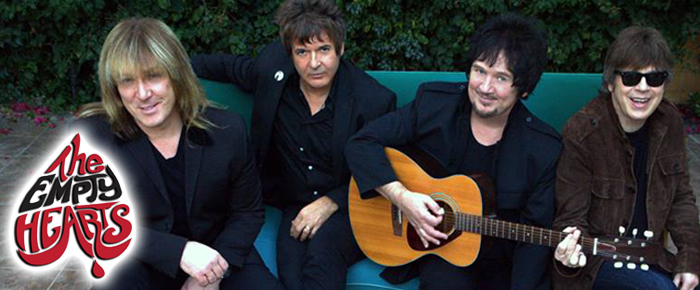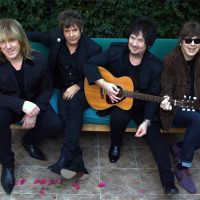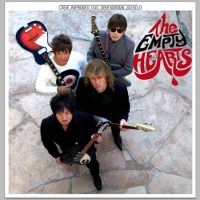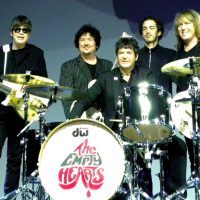
By Eleni P. Austin
Rock & Roll reinvents itself all the time. New sub-categories crop up every day. Oi, Emo and Slowcore have all had their moment in the sun. The one genre that remains perennial is Power Pop.
Maybe it’s because the Beatles kinda sorta invented Power Pop, (a term coined by Pete Townshend). Characterized by strong melodies, crisp vocal harmonies, economical arrangements and crunchy guitar, Power Pop songs are almost irresistible.
For almost half a century, Power Pop has staked a claim in the firmament of Rock & Roll. In the 60s, there were the Beatles, Small Faces and the Who. At the dawn of the “Me Decade,” the Power Pop torch was carried by the Raspberries, Big Star and Todd Rundgren.
The style experienced a mini-renaissance in the late ‘70s/early 80s when the Knack took their song “My Sharona” to #1 on the Billboard charts. Suddenly, there was a plethora of Power Pop bands to choose from. The Plimsouls, Cheap Trick, the db’s, the Shoes, the Romantics, the Cars, Dwight Twilley Band, 20/20 and Paul Collins Beat were just the tip of the iceberg.
Although its popularity waxed and waned, Power Pop continued to be a driving source in the ‘80s with Marshall Crenshaw, XTC, Let’s Active, the Hoodoo Gurus and the Smithereens. By the ‘90s the sound was sustained by Matthew Sweet, Material Issue, the Posies, Jellyfish and Fountains Of Wayne.
Toward the end of the 20th century, Power Pop even got its own festival, International Pop Overthrow. The annual event began in Los Angeles in 1998, and has expanded to cities all over the country, (from San Francisco to NYC) and even Liverpool. The fest set up camp at the infamous Cavern Club, the spot where it all began for the Beatles.
Ironically, the Raspberries’ “Go All The Way,” (#1 in 1972), was recently introduced to a whole new audience thanks to the Marvel Comics action movie “Guardians Of The Galaxy.” Suddenly millennials are downloading this enduring song.
Really, there couldn’t be a better time for the formation of Power Pop’s first “super group,” the Empty Hearts. The four piece was the brainchild of Andy Babiuk, bass player for Garage Rock revivalists, the Chesterfield Kings.
At the tail end of 2012, the Chesterfield Kings reign was coming to a close, following 30 plus years together. Babiuk’s mission was simple: start a band that captured the original joy and enthusiasm he had playing Rock and Roll.
So he reached out to some old friends with pretty impressive resumes such as Blondie drummer Clem Burke, Cars guitarist Elliot Easton, and Wally Palmar, vocalist and rhythm guitarist for the Romantics.
The quartet managed to carve out some time to get together to write and record some demos. Pleased with the results, they set up studio time and enlisted the help of veteran producer Ed Stasium.
Stasium has been around since the ‘70s. He has worked with everyone from the Talking Heads and the Ramones, to Living Colour, the Smithereens, Marshall Crenshaw and the Misfits.
With Stasium at the helm, the record came together quickly. Most songs were done in one take. The whole album was completed in an astonishing five days. But the band still hadn’t settled on a name. So they enlisted the help of longtime friend Little Steven Van Zandt.
Best known as guitarist for Bruce Springsteen’s E Street Band, Van Zandt has also carved out a successful acting career (“Sopranos”), and has championed the revival of ‘60s Rock on his Sirius radio show “Little Steven’s Underground Garage.” Van Zandt showed them his secret list of unused band names, and then insisted they call themselves the Empty Hearts.
Their self-titled debut opens with “90 Miles An Hour Down A Dead End Street.” Anchored by a walloping backbeat, insistent harmonies, careening guitar riffs and a searing harmonica solo from Palmar, the lyrics offer a mixed message about the thrill of sexual frisson.
Four tracks, “(I See) No Way Out,” “Soul Deep,” “Loud And Clear” and “Perfect World,” kick the album into overdrive. On “(I See) No Way Out” Pummeling drums collide with a flurry of stuttery, sustained guitar chords. Between Easton’s kaleidoscopic riff-age and Burke’s explosive fills, Palmar weighs the pros and cons of instant attraction.
The muscular stop-start rhythm, thrumming bass and live wire guitar licks of “Soul Deep” belies Palmar’s equivocation over a doomed relationship. Here, Burke’s pile-driving style echoes the mighty Keith Moon while Easton’s fiery solos are a pyromaniac’s delight.
Crunchy, tilt-a-whirl riffs and a tick-tock rhythm propel “Loud And Clear.” Palmar counsels a troubled friend to ditch the pharmacopeia and embrace his inner strength. “Shine a light, it just might help you see/It’s your faith that can heal you.” Easton unleashes a corrosive solo that builds to a shattering crescendo.
Finally, over a chunky backbeat, Palmar rejects the superficial trappings of the bourgeois on “Perfect World.” “Tucked inside your lovely mansion fancy parties, dressed up lights/Are nothing more than cheap scandal.” Easton’s fractious guitar solo pinballs between Babiuk and Burke’s ricochet rhythm.
The action slows only slightly on a couple of songs, “Fill An Empty Heart” and “I Don’t Want Your Love (If You Don’t Want Mine),” The former is powered by jangly guitar notes and a rippling Bossa Nova beat. Palmar’s quietly pleads for love and understanding…”Everybody needs someone.” His tone is underscored by sweet harmonies and a hint of Hammond B3 organ, provided by British Invasion demi-god, Ian McLagan.
On the latter, a mid-tempo rocker, Palmar’s mien is caustic. Over chiming guitar and roiling bass lines, he chafes at a lover’s manipulations.
If Gram Parsons and the Nazz had ever collaborated the result might have been “I Found You Again.” A countrified charmer that features twangy guitar and a loping beat. It shares some musical DNA with the Rolling Stones’ “Dead Flowers.”
Other interesting tracks include the prickly “Just A Little Too Hard,” and the kinetic, candy-coated crunch of “Drop Me Off At Home.” On “Jealousy,” Palmar weaves a stinging harmonica solo through walking bass lines, sinewy guitar notes over an undercoat of Hammond B3 organ.
Blending a tribal backbeat, raucous guitar riffs, gliding bass and buzzing harmonica, “Meet Me ‘Round The Corner” is the powerhouse track that brings the album to a frenzied finish.
The Empty Hearts manages the neat trick of sounding new and familiar at the same time. Babiuk’s original goal was to have fun and make some music. Mission accomplished.















































